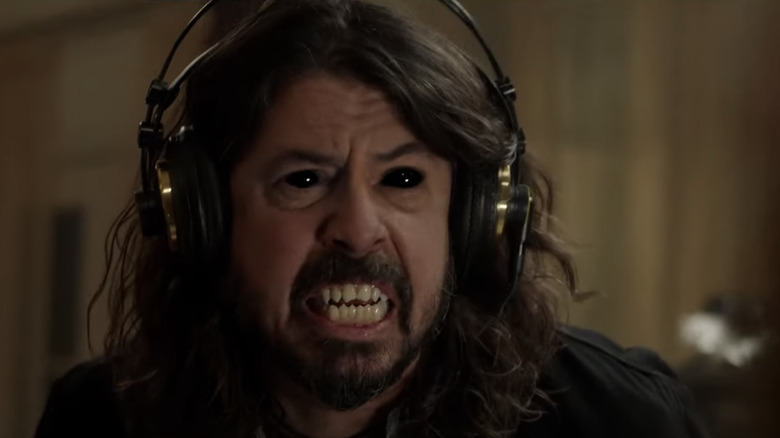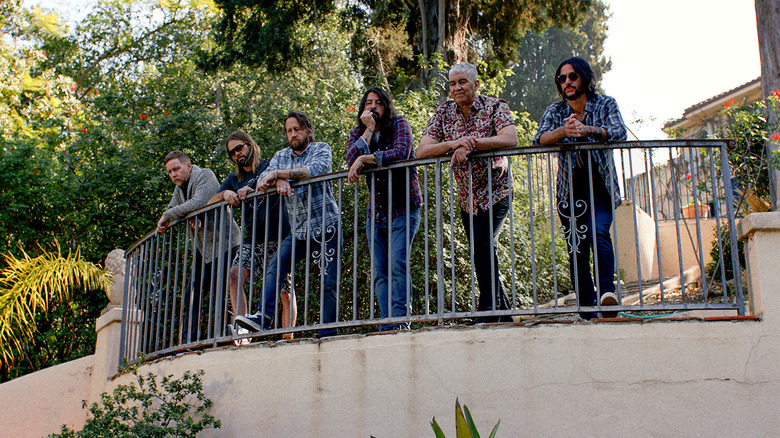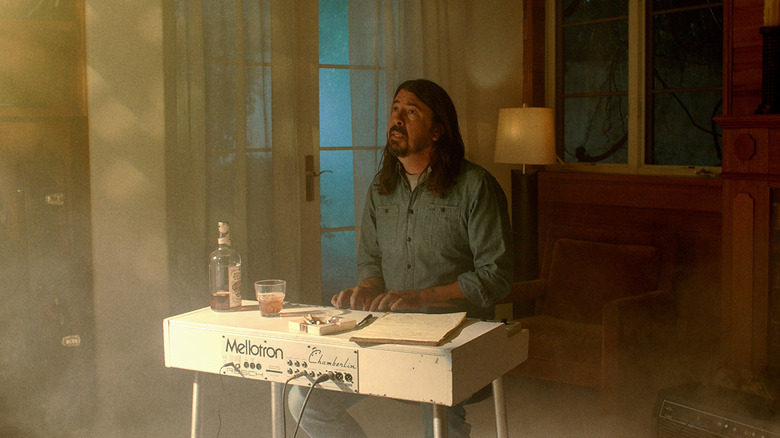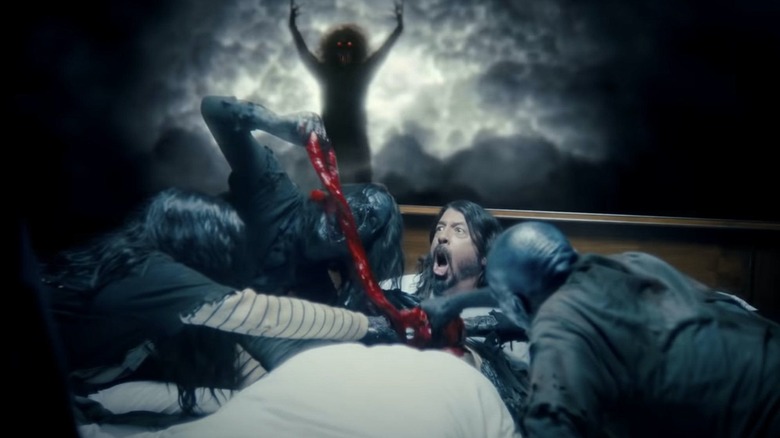Studio 666 Co-Writers Jeff Buhler And Rebecca Hughes Kill The Foo Fighters [Interview]
"Studio 666" always has its tongue in its cheek. The horror-comedy, in which Dave Grohl becomes possessed and devours the rest of the Foo Fighters, never takes itself seriously in the slightest. The jokes and kills go big. Maybe beneath the grilling, the cannibalism, and the band's infighting over a never-ending song, there's a story about the fear of losing your friends or band mates and, as a result, yourself. It's a story older than rock and roll.
For "Midnight Meat Train" screenwriter Jeff Buhler and comedy writer Rebecca Hughes, it's simply a party movie, not a meditation on morality and the creative process. The lightness of the film has drawn mixed reactions from audiences, but the writing duo remain proud and hopeful "Studio 666" will keep finding its people. During a recent phone interview, Buhler and Hughes talked to us about their memorable experience writing the film, including the four days Hughes wrote the first draft from a hospital bed.
This interview has been lightly edited for clarity.
'It's show business, people'
Dave Grohl had a few pages worth of ideas, right? What were they?
Buhler: If I remember correctly, one of the central things that he had was this idea of a caretaker, the creepy guy that we see at the beginning, who's the leader of the spirits in the house. Then we expanded upon that by building the mythology out around that, but that was one of the central ideas that he came up with.
Hughes: Dave's idea was that they move into this house, and then he becomes possessed and kills the band. Further to that, he and [makeup effects designer] Tony Gardner were our friends and had come up with a list of kills. A lot of those kills that you see, Dave and Tony were very committed to having those play out.
Including the bedroom kill?
Hughes: Yes, the bedroom kill included.
Buhler: As a matter of fact, when Dave was describing that one to us, he kept referring back to "Friday the 13th" and the classic kill when Kevin Bacon gets the arrow up through his throat from underneath. He just wanted to do something that paid homage to that, but then went a 1,000 times further.
When you heard that idea — Dave killing his band — what did you think that meant deep down?
Hughes: I was like, oh boy, over 20 years, it's symbolic, of course. But I think, just knowing Dave, it's all in fun. He just loves humor and having fun and taking the piss out of himself and the band. I went to hang out with him for a couple hours and there was no ... anything that we played up in the script in terms of conflict within the band was totally us trying to come up with conflict.
Buhler: You have to wonder if there's some underlying subconscious dynamic that's going on when he brings up that idea, and some of the tension between the band members. We just tried to lean into those little fracture points and then just exaggerate everything as much as possible.
Rebecca, you wrote the first draft in four days, right?
Hughes: Oh yes, I did. I will say, the first 80 pages, not quite the first entire draft, but yes.
Buhler: It was pretty much the whole thing. I mean, there was maybe the ending left.
Hughes: Just the ending was left. What happened was, we had commenced on the script and it was right around the holidays, because I think the first meeting we had with them was in October, and then it was a pretty quick process coming up, back and forth, getting to hang out with the band. We had lunch with the bass player, and he filled us in with some band personalities.
Around the holidays, Jeff and I had laid out the workload, where I would lay down the first draft and then Jeff would come in and sprinkle his magic on it and tweak and do whatever he needed to do. And especially, add the gore and the horror and all that, which is his expertise. So we had agreed that was going to be the deal. Then I had an emergency and was sent to the hospital.
I had about maybe five to seven pages laid down, because it's the holidays. Every day that went by that I wasn't getting more page numbers, I'm like, "Oh my God, they need the script." I mean, they were already in pre-production, so it was like, "Oh my God, we need the script yesterday." I was really going to get to work right after Christmas, and then I ended up having a health issue with my colon, which is why this is so fortuitous when Dave gets his intestines and colon ripped out.
There's a lot of weird stuff like that. Yeah, I basically perforated my colon. So I had to stay in the hospital for four days and Jeff was like, "Oh my God, you can't be hospitalized. We need to get this script done." And I'm like, "I know." We were both freaking out and he was like, "Well, what do you need?" And I was like, "Well, I need some clothes and a toothbrush. And my laptop." He's like, "You're going to write it in the hospital?" And I was like, "Yes, man."
Buhler: The show must go on.
Hughes: Yeah, the show must go on. It's show business, people. I'll tell you, it was the greatest thing ever, aside from the fact that I could not even put water to my lips, because nothing could go down. They were healing my colon naturally rather than having to have immediate surgery, we were trying it the natural route. So, I was very thirsty, but I did have an IV. But aside from that, man, I just sat there and wrote it eight hours a day, 10 hours, 12, whatever. I just wake up, start writing, go to bed, wake up again, start writing.
Buhler: You got to remember, they had recorded the album in that house, just as it is in the movie. They had been in there and they were still recording when we were first discussing this idea. So, there was a lease and a timetable, and if they were going to make this movie, it had to be on this particular calendar. So, when we got involved creatively, the train was already rolling. They were prepping off the outline. We had a very detailed outline before the end of the year and before the holiday, but there was no break for us. We just kept going. And so, as Rebecca said, when she unfortunately had to spend a few days in the hospital, the work still kept flowing. There was no slowing down the train.
Rebecca, if someone's in the hospital getting their pages done, I think most people don't have too many valid excuses for not getting their pages.
Hughes: Yeah, exactly. Writing sometimes, when life happens, you're just like, "Oh my God, how am I not writing?" But when you are forced to just lay there, it's like nothing else to do. So, in a weird way, it was a blessing, because I got that thing done in, like I said, four days. They shot pretty much the first draft, for good or bad. I mean, some would say, "Do a couple more drafts, honey." But Dave loved it, so they just went for it. They were like, "Okay, thanks." And then they just took it and ran and started making it. We were like, "Wait, don't you know about notes and shouldn't there be rounds and rounds of notes, like studios always do, and all that?"
Buhler: It's one of the joys of working with musicians, especially people like Dave, where it's like, he gets an idea and he just wants to do it. So, he just does it. It just doesn't cross his mind that the train could come off the track. So he just kept going, and I think we all fed off of his passion for the project. He was really enthusiastic about it.
I think he even read the outline to his mom before the holidays and reported back that she was laughing out loud and that she really enjoyed it. So we knew they were behind the way we had laid things out and the structure of it. It was exciting and fun to feed off of that energy.
'Dave brought everybody to a Coldplay show'
Rebecca, when it comes to the comedy, how did you want to stay true to the band's voices but also deviate from them?
Hughes: It's funny, because I've read a few things and I think people have said, "Oh, there's no character development." That always makes me chuckle, because we were actually told that, "Give most of the lines to Pat, Dave, and I think a little bit to Chris." But mostly Pat and Dave, and Rami, because they're more comfortable in front of the camera. I think back in the day, maybe Pat was in some TV episodes and playing some ne'er-do-well and was used to the camera. Obviously, Dave loves the camera and is so hilarious, such a natural actor.
It's funny when people are saying, "They're not actors and there's no character development." I'm like, "Oh my gosh." We were told, "If they can even memorize their lines, that'll be good." So, we were working with those parameters. I just did an exaggerated reality of what's going on with them in terms of a little grill competition.
Jeff and I discussed and I just thought, "What is it like to be a rock star? I mean, what is that actually like? Who says no to Dave Grohl?" We all talked about him being possessed, but then it was like, when I was sitting there in my hospital bed, it's like, "Well geez, how does this actually work? What does that mean, really?"
I just thought it'd be funny if he turns into this crazy maniac of himself, and is going to write a song that never ends, and he's so amazing, he's going to invent a new f***ing musical note. That's just funny to me. So, we just kind of made fun of him. To be honest, we thought he was going to note us on it. When we handed in the script, I remember I was like, "Oh boy, is he going to fire us off this project?" We make so much fun of him. And he did, he really liked it.
Buhler: He loved that. Yeah, he really responded to that. And the idea of, because he's such a popular figure, we all know the divas of the world. I think people know Dave Grohl's not like that. He's the nicest guy. Everyone, whether you're a Foo Fighters fan or you just know him through the public sphere or whatever, he's universally loved. He's very charming. So, it was super fun to make him into this demonic diva, right? Where he's using his power and his stature to exploit the band for what he needed to get out of them.
Hughes: It worked also with the story, because he has to start killing his band, so they have to be fighting about something. So it worked in terms of that, too, plotting and structure and all that stuff.
Is that advantageous, the likability of the band? Just knowing from the beginning of telling the story, you already have a large audience who will like these characters?
Hughes: Exactly. And it wasn't a lot of pressure to really develop Taylor's character. It's like, we know who he is and people already like him, like you said, so there's an affinity there. There was the thing of, "Will he, can he, is he willing to memorize his lines?" So we were told to cut those down.
Buhler: They not only jumped into it enthusiastically, but when it came time to perform this version of themselves, they all just basically took it and ran with it. There were moments where they were just riffing on stuff and adding their own flavor to it. Their personalities were laid into the story and you get that in the dynamic of the characters, but they all just took it and ran with it. It was like everything was turned up to 11, to use a "Spinal Tap" reference, but they really enjoyed it, I think.
What sound did you both initially imagine for the never-ending song?
Hughes: What we thought was just, he's possessed, so it should be a demonic, thick, and heavy-sounding song that sounds demon-esque. And we thought, because the Foo Fighters are awesome, it's incredibly accessible rock and roll music, and we just thought with the demon element, it should just be a different sound a little bit. So, that's how we came up with that. But then Dave, when I pitched that to him, I was like, "Do you have a demon, a thick, heavy song?" And he's like, "Oh yeah, I have that. I have that."
Buhler: In his spare time, he's working on other stuff that's clearly not Foo Fighters material.
Hughes: Well, he had a band called Probot, and I think that's Probot's stuff. I didn't realize what Probot was, but it's all that dirge stuff. So, it worked out. It worked.
This is not the first time in Foo Fighters history there's been a playful dig at Coldplay.
Hughes: Oh, yeah.
How did that come about?
Buhler: It's funny, because Coldplay's a band that you love or hate. Dave has had this ongoing battle with the singer of Coldplay, with playful little digs at each other. I'll speak for myself, but Rebecca, I think you probably agree, they're just funny for some reason. To make fun of Coldplay is just funny. Dave absolutely goes into that, because he's like, "Oh my God, Coldplay ..." I think he's had a history with them.
Hughes: I knew the band, the Foo Fighters, because I was a guest of the Eagles of Death Metal, back in the early aughts and I was a guest on their tour and they were opening for the Foo Fighters. So, I ended up meeting the band, and one night Dave brought everybody to a Coldplay show, which was in London at some big arena. That night I think he was talking about, just joking around about Coldplay, but he was digging them and stuff, but he was also just joking around.
I remembered that night. It was the perfect opportunity for that. So it's just taking what you know, and then when the moments come up, the opportunities come along in the script, inserting what you already know about it. That's where the heightened reality comes in.
''Spinal Tap' meets 'Scooby-Doo' meets 'The Monkees''
Is that a great experience that happens when you're a writer, where a fun life experience, from the sound of it, later comes full circle and influences a script?
Hughes: My big joke was, they didn't even know I was a writer back then. They didn't even know. They just knew I was some chick along with the Eagles of Death Metal. They had no idea. I mean, I had hit it off with Dave, because he's a lot like Jeff, who's obviously a dear friend, and many of my other friends who were very funny. So, it just felt like hanging out with them. We were friendly, but whatever, then went our own, of course, separate ways.
I always joke that experience would be like when I'm 90 in the nursing home and in my rocking chair, like, "The time I went on tour with the Foo Fighters...." Everyone's always going to be like, "Yes, Rebecca, we've heard it 9,000 times." And so, when this opportunity came up, it was a call in from Jeff, who got the call initially for the job, because he's such an accomplished horror writer. He pulled me in, because it was comedy and my familiarity with the band. When that happened, it was like a miracle. I couldn't believe it. I was like, "I can't believe I went on tour with them so long ago and now it's coming full circle." Then, the whole question was going to be — and Jeff and I were asking on the way up to the first meeting — "Will Dave remember me? The man meets a lot of people and it's not like we hung out that much." He did.
Buhler: And it was a few years before that you were on tour with Eagles and the Foos.
Hughes: Oh, it was like a decade. It was a long time.
Buhler: Both Rebecca and I have gone to a lot of shows and have a lot of friends in the music industry, so we've been in and around that scene a little bit, which is also something that we wanted to pull from, the behind the scenes element of making a record and the dynamic with the manager and all that stuff. So, all of those experiences that you pull from your life, really helped to give the film a sense that it's got at least one toe in reality, and then it goes nuts.
Clearly, it was a great experience. At the beginning of the call, you brought up how the reaction to the movie has been mixed. Given how positive the job was, though, do you just focus more on the experience?
Buhler: It's funny, I've never written a horror-comedy. I've always done pretty straightforward horror and really hardcore stuff. You always get mixed reviews in the genre. It's very rare for any horror film to be embraced universally. With this, I mean, it's such a particular taste with the self-deprecating humor and the irony and them being self-reflexive. I wasn't surprised that some people either loved it or some people just didn't get it, and then some people just didn't like it. So, it's always fun to see that splintering.
I would probably say it was one of the most fun and most satisfying writing experiences, because we knew that the movie was going forward and the process was so fast and everybody was so enthusiastic and fun to work with, that it was just a thrill. By the time it came out — and you have to remember, they shot this just before Covid, and had to shut down production in March of 2020, and then went back six months later and picked up the material that they had not been able to capture because of the lockdown. So by the time it came out, I was just so pleased to see it on the screen with live people, that by that point, it didn't really matter to me what anybody thought about it.
Hughes: I think Jeff has a thicker skin than me, because Jeff has had way more movies come out. In fact, this is my first one. I was surprised that people were expecting something more serious, I guess. In terms of the comedy and in terms of the horror, I was thinking that everybody would know it was a goof. And so therefore, when I did go down the rabbit hole of reading some of the bad reviews, I was like, "Oh boy, they're not seeing it...." Whatever, there's some validity, I'm sure, but whatever. I just was expecting people to understand that it was going to be "Spinal Tap" meets "Scooby-Doo" meets "The Monkees." When the people were just like, "You have a responsibility as a filmmaker," I'm like, "Oh, dear. Okay. I see." So then I quickly shifted my expectations and now I'm just happy if it's a cult hit film on any level.
To Jeff's point, "Midnight Meat Train" got a mixed reaction when it came out, but I don't know a single horror fan, myself included, who doesn't love that movie now.
Buhler: Yes. And it's funny, because that movie came out and got very strong reactions from people and it came out during a time when the studio was going through a regime change. It was just a strange release. Since then, it has found its audience and people are so passionate about it. I remember seeing the trailer for the first time in the theater and thinking, "'The Midnight Meat Train,' just the title itself is insanity. It's crazy." So, it's fun to work on stuff like that or like this, where you just put your best into it and see what happens. If something works, it'll find its audience. I think that's where this film is headed as well.
"Studio 666" is now playing in theaters.



